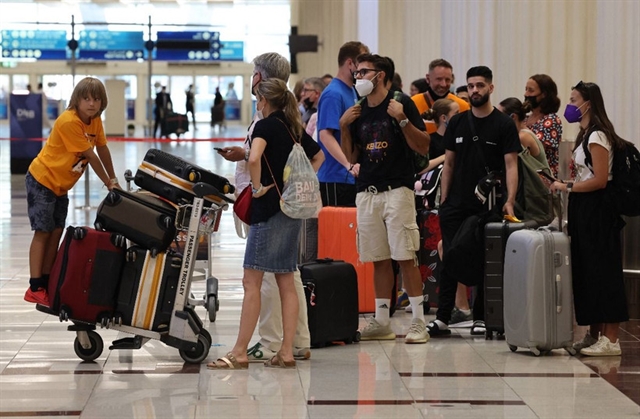

Serving as the Deputy General Director of Bamboo Airways in charge of flight operations since January 2019, Eddy Doyle, former Air Canada leader, talked about Bamboo Airways’ service quality and staff, as well as his expectations for Bamboo Airways on the occasion of the airline's one-year anniversary.
Serving as the Deputy General Director of Bamboo Airways in charge of flight operations since January 2019, Eddy Doyle, former Air Canada leader, talked about Bamboo Airways’ service quality and staff, as well as his expectations for Bamboo Airways on the occasion of the airline's one-year anniversary.

|
Eddy Doyle, Deputy General Director of Bamboo Airways in charge of flight operations. — VNS Photo
Despite being a new airline, Bamboo Airways has received positive feedback on service quality. What are the principles of building service quality for Bamboo Airways?
Before discussing service quality, I would like to emphasise that aviation safety is always the first priority for any airline. After aviation safety, service quality is a key factor in making an airline’s brand name.
Airlines can use the same type of aircraft, provide the same meals, and partner with the same providers, but service culture is the only thing that is nearly impossible to copy.
Good service is the key to commercial success. Bamboo Airways’ crew members in particular, and all of its staff in general are well aware of this. We always strive to develop Bamboo Airways' own culture.
Some other airlines are only concerned about arranging as many seats as possible in the cabin, while Bamboo Airways cares more about implementing the commitment to bring the "More than just a flight" experience to passengers, making them feel that in addition to a safe flight, they can relax with services offered by dedicated staff, and find flying with us a truly great experience.
Bamboo Airways has attracted a lot of attention with photos of a big and multinational pilot team. What do you think about that?
Seeking and recruiting pilots nowadays is much more difficult than it was 15- 20 years ago. There are a lot of criteria and requirements for them to meet. These are not only suitable for the needs of pilots in Việt Nam, but also worldwide.
Conducting pilot interviews is our hardest task. If we're lucky, we can recruit 2 to 3 pilots every day, but there were times when we had to reject half of the candidates. Even on some “bad” days, we could only choose 1 out of 10.
Bamboo Airways spends a lot of time and effort in recruiting pilots, because we consider it not simply to fill the positions, but to find the right people. Pilots are responsible for the safety of hundreds of passengers, so they must be the most professional.
The photos you mentioned were taken in the meeting between Chairman Trịnh Văn Quyết and our foreign pilots. It was a very important meeting.
Despite the fact that our foreign pilots come from a lot of countries, they all were attracted to the conversation with Quyết. His ability to spread motivation and energy was great, overcoming language barriers.
I think when you find that your boss is really passionate and enthusiastic about his work, you really want to embark on the journey with him.
Having been a veteran long-haul pilot in Canada, did the field experience help you a lot with the management of Bamboo Airways’ fleet?
Flying is always my passion. When I was a leader at Air Canada, sometimes I went flying, and it was always a pleasure. Working as a pilot trains you in a lot of virtues.
As a pilot, you must always have your plan B. If you drive a car in bad weather, you can stop at the side of the road and think of what to do next, but you can’t do that when flying an airplane. When the weather starts to change, you start to think, and plan B is for backup in the most unpredictable cases.
As a manager, you must be able to plan for the long term. What you do today is to prepare for whatever happens in the next six months. Take our current pilots as an example, for now, the total number of them exceeds the required number, so that we can be ready for new aircraft to be added in the future.
I always require all procedures to be carried out accurately by all crew members. No mistakes are accepted.
In addition, we put weight on on-site training. Our pilots are still trained every six months, and the fleet is also trained on ground operations every year.
Running an airline is similar to running a "school". Educational and training activities must always take place.
Recently, we have commenced construction of Bamboo Airways Aviation Academy in Quy Nhơn, and we also have received the ATO (Approved Training Organisation) certificate for Bamboo Airways Training Centre. These will play an important role not only in the training, maintenance, and supply of qualified pilots, flight attendants and aviation personnel for the Airline, but also for the entire aviation industry of Việt Nam.
In short, a captain takes care of the flight's operation for a few hours, while a manager takes care of the future of the airline for months and years.
On the occasion of one-year of launch, what is your vision for Bamboo Airways in the next five years?
Currently, the airline is operating 25 domestic and international routes. A friend once told me: “I like to fly with Bamboo Airways, but I need to fly to Bangkok so I have to choose another airline.”
Therefore, furthering the flight network’s expansion and increasing the flight frequency to perfectly meet the travel needs of passengers will be one of our main goals. A wider network must be built so that customers can fly with the airline to more places. The fact that the Government has officially approved Bamboo Airways to increase our number of aircraft to 30 will create favourable conditions for us to carry out the process.
My expectation for Bamboo Airways in the next five years is that Bamboo Airways will not only become the airline for Vietnamese people, but also for international passengers when they need to come to Việt Nam. This is not only beneficial for passengers, for Bamboo Airways, but also for the tourism industry and the entire economy of Việt Nam.




